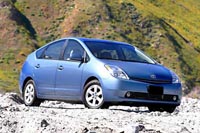Toyota-Ford possibilities likely limited to green technology, analysts say
Stocks in Japan's Toyota Motor Corp. and Ford Motor Co. of the U.S. may have jumped overnight on news that their chief executives met recently, but analysts Thursday said ties between the two were likely to be limited to Toyota passing green technology on to Ford.

Reports that Toyota Chairman Fujio Cho had recently met in Tokyo with Ford Motor Co. President and Chief Executive Officer Alan Mulally at the latter's request sparked investor hopes about a potential alliance between the two rivals and sent their shares sharply higher Wednesday.
Ford's share price rose 10 cents to US$7.59 Wednesday on Wall Street, while Toyota shares spiked US$2.39 to US$134. Toyota also gained ground on the Tokyo Stock Exchange, adding 1.9 percent to finish Wednesday at 7,920 yen ($66.68).
Neither company offered any details about what the two executives had discussed, though several media reports said the talks appear to have focused on Toyota's environmental technology.
The troubles in the U.S. auto industry in the face of their Japanese rivals' success have led to major restructuring efforts by U.S. automakers, and Ford has been no exception.
The No. 2 U.S. automaker behind General Motors Corp., Ford lost US$5.8 billion (Ђ4.41 billion) in the latest quarter.
But while investors may have been cheered by speculation that Ford could partner with its Japanese rival the world's No. 2 automaker analysts said cooperation between the two would likely be restricted to Toyota sharing technology with the U.S. automaker.
"Remember, it was Ford that came to Toyota," Shinko Securities senior analyst Shinji Kitayama said Thursday. "Toyota probably doesn't feel it has anything in particular to gain from closer ties with Ford, but for Ford Toyota's green technology is attractive."
Toyota has been a leader in the field. The company's hybrid-electric Toyota Prius topped the U.S. government's annual top-10 fuel economy list for 2007 vehicles released this past October.
It also has a record of technological cooperation with Ford in environmental technology as well, having inked an agreement in March 2004 licensing Ford several of its hybrid system and emissions purification patents for use in Ford's own hybrid system, reports AP.
For Ford which has acknowledged that lags behind rivals in offering the right mix of fuel-efficient models to consumers acquiring green technology may be one of the keys to remaining competitive in the marketplace.
"U.S. automakers have been behind their Japanese counterparts in environmental technology," said Shinya Naruse, an analyst with Nomura Securities. "They recognize that they will need to do more in the future and it may even be necessary for continued growth."
Subscribe to Pravda.Ru Telegram channel, Facebook, RSS!


